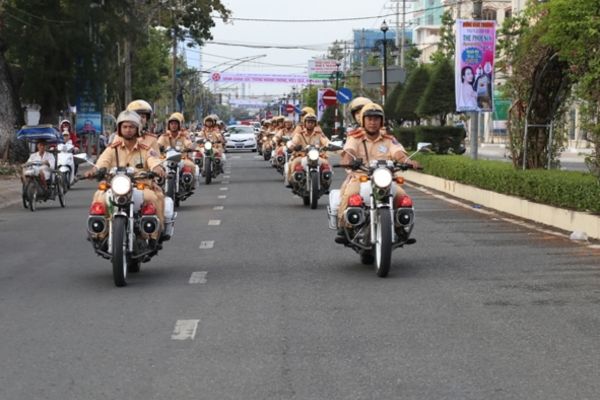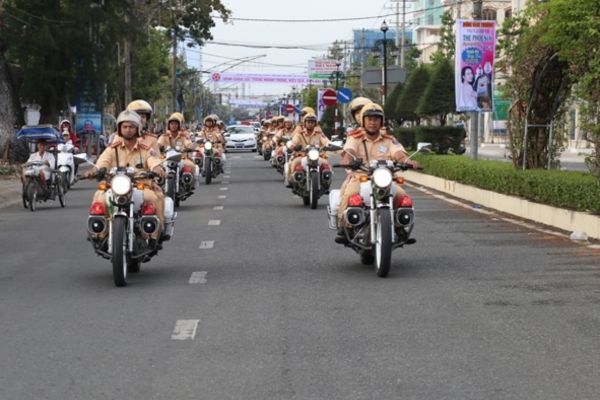Who Has the Authority to Handle Violations During Road Traffic Order and Safety Patrol and Control?
Who is Authorized to Handle Violations during Patrols and Traffic Control on Roadways?
According to the provisions of Clause 2, Article 33 of Circular 32/2023/TT-BCA, apart from traffic police, other police forces are authorized to handle traffic violations during patrols and traffic control within their jurisdiction.
Commune police are only authorized to patrol, control, and handle violations on commune roads and other roads within the commune's area of management.
Additionally, commune police may stop motorcycles, mopeds, electric bikes, and rudimentary vehicles when detecting the following legal violations:
- Not wearing a helmet as prescribed;- Carrying more passengers than allowed; transporting oversized or overly bulky goods;- Parking non-compliantly; speeding, swerving, zigzagging; missing the left-hand side mirror;- Using an umbrella (parasol);- Operating a vehicle without being of the legal age;
If a vehicle poses a serious threat to public security or safety and poses an imminent danger if not immediately addressed, it can be handled according to legal regulations.
During the handling process of the above-stated violations, if other violations are discovered, they can be handled within their jurisdiction. If the violation exceeds their jurisdiction, they must draft an administrative violation record and report to the competent authority to issue an administrative penalty decision as per the law.

Who has the authority to handle violations during patrols and traffic control on roadways? (Image from the Internet)
What Documents Can Traffic Police Temporarily Seize?
Based on the provisions of Point d, Clause 2, Article 21 of Circular 32/2023/TT-BCA, the regulation is as follows:
Applying measures to prevent administrative violations and ensure the handling of administrative violations
...
- Temporarily seize evidence, vehicles, licenses, and professional certificates for administrative violations.
...
d) In the case of a monetary penalty, the traffic police officer will temporarily seize one of the following documents in order of priority (unless the documents show signs of being counterfeit and need verification, in which case additional relevant documents can be seized): driver's license, certificate of legal knowledge training on road traffic, vehicle registration certificate or a certified copy of the vehicle registration certificate with the original receipt from the financial institution still valid (during the time the financial institution keeps the original vehicle registration certificate) or technical safety and environmental protection inspection certificate, validity confirmation of the inspection certificate and inspection stamp (for vehicles that require inspection), or other necessary documents related to the evidence or vehicle as required by law to ensure the execution of the penalty decision;
...
Thus, if only a monetary penalty is applied, traffic police can hold the related documents to ensure the execution of the penalty decision.
Traffic police can temporarily seize one of the following documents in the order provided:
+ Driver's license
+ Certificate of legal knowledge training on road traffic or Vehicle registration certificate or a certified copy of the vehicle registration certificate with the original receipt from the financial institution still valid (during the time the financial institution keeps the original vehicle registration certificate) or Technical safety and environmental protection inspection certificate,
+ Validity confirmation of the inspection certificate and inspection stamp (for vehicles that require inspection) or other necessary documents related to the evidence or vehicle
Note: If the aforementioned documents show signs of being counterfeit and need verification, additional relevant documents can be seized.
Under What Circumstances Can Traffic Police Stop Vehicles?
Based on Clause 1, Article 16 of Circular 32/2023/TT-BCA, there are four circumstances where traffic police may stop vehicles during patrol and traffic control as follows:
- Directly or through technical and professional means and equipment detecting and collecting evidence of traffic law violations and other legal violations;- Implementing orders, plans for comprehensive vehicle inspection to ensure road traffic safety and social order; patrol, control, and thematic plan on handling violations ensuring road traffic safety and social order approved by competent authority;- Having a written request from the Head or Deputy Head of the investigating agency; written request from competent related agencies to stop vehicles for inspection to ensure security, order, crime prevention and combating; natural disaster, fire prevention; disease prevention and control; rescue operations and other legal violations. The request must specify the time, route, vehicle for inspection, handling, and coordinating forces;- Receiving reports, feedback, recommendations, or denunciations from organizations or individuals about legal violations of operators and vehicles participating in road traffic.
LawNet
